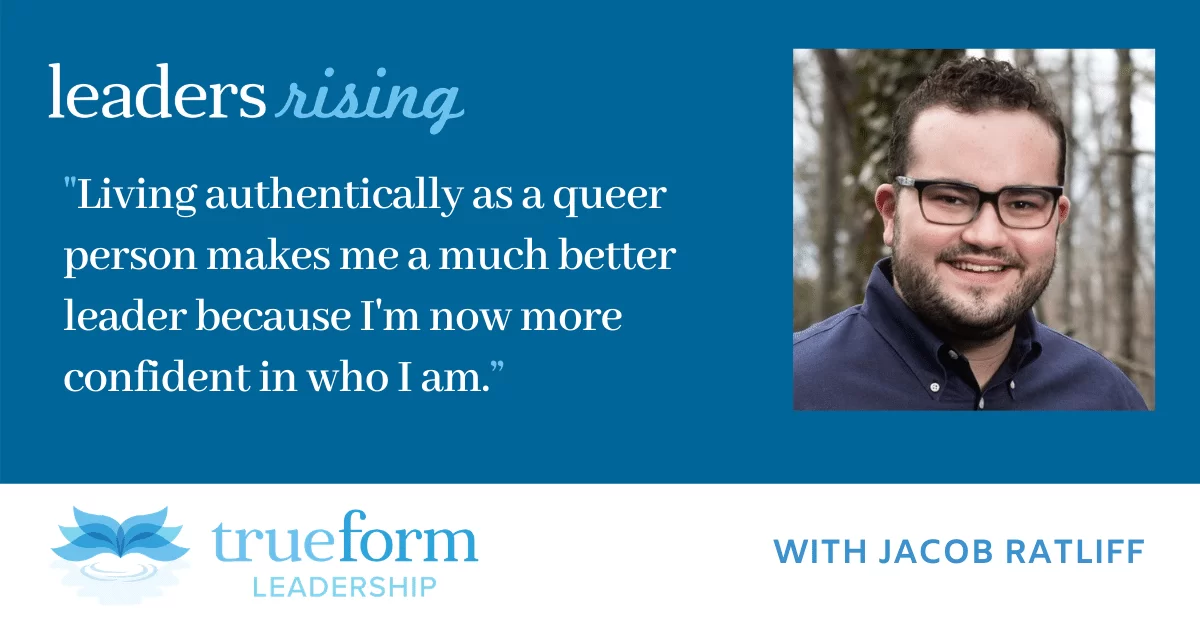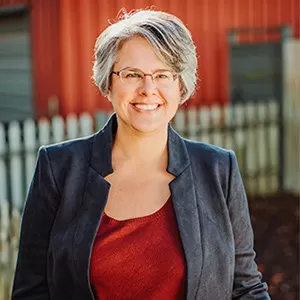Leaders Rising: Jacob Ratliff
Welcome to Leaders Rising, where we explore the development journey of leaders who’ve risen from the ashes of adversity, examining the leadership gifts born from their experiences, the challenges that have held them back, and the moves they’ve made to transcend hardship and openly face the ragged edges that still remain.
Described by his parents as a quiet, anxious and depressed child, Jacob Ratliff always sensed he didn’t fit in.
This became painfully apparent to him during the summer after his sixth grade year, when his family left their upper-scale home in Virginia and moved to a lower-tiered house in a more affluent neighborhood in Charlotte, North Carolina. “I was keenly aware of the financial and social gap between myself and the others at school,” Jacob reflects. Not only did Jacob notice he was financially less well off than his peers, he began to realize he was politically and socially different from the largely conservative, Christian community they’d moved into.
The kids in his school noticed his differences, too, and began to bully him and call him “gay.” Too young to have an awareness of his own sexuality, Jacob was pained by this teasing and went to extraordinary lengths to dress and behave as straight as possible in order not to stand out. “I didn’t understand what they saw in me to warrant being labeled ‘gay’. I obsessed and second-guessed myself trying to fit into some expectation of my peers. I overthought everything.”
Four years later, as Jacob matured, he began to discover more about himself and his sexuality. “I began to suspect I might actually be gay.” This realization also brought up a lot of questions about his spirituality. “My father was a Presbyterian pastor and while he had declared that my sexuality and being a Christian were not at odds, I still didn’t believe this to be true. I believed I had to hide my truth about being gay. Panicked about this discovery, I believed I had to live a ‘normal life’ and suffer in silence.”
Eventually Jacob came out in high school. “From the outside ‘coming out’ may be seen as freedom but, it’s also stepping into an entirely different culture or set of rules and expectations.” Jacob had hoped that coming out would relieve all his feelings of difference, and the childhood depression and anxiety that accompanied it, but fitting into this new culture was equally challenging. “I had subscribed to the narrative that coming out was going to fix everything, but I was still ultimately dealing with the same set of issues.” Jacob was still haunted by fears of rejection which manifested in a strong need to fit in coupled with an equally strong belief that he would never fit in. Again, he contorted himself into what he saw were cultural norms – this time of what it meant to be a gay teen.
I felt like I could be myself for the first time in my life.
After graduating high school, Jacob searched for a gay friendly college and chose Warren-Wilson, a small college outside of Ashville, NC where 42% of the student population was LGBTQ+. He felt like these were ‘his people’ but they came from such different backgrounds. “Suddenly I was thrust into an openly gay, liberal arts campus environment, having come from an educated, monied, conservative Christian community.” It was a jarring experience, but he decided to embrace it. “I felt like I could be myself for the first time in my life.”
In addition to the welcoming culture in the college, Jacob was supported in his development through the mentorship of the school’s chaplain, a Southern Baptist preacher, who also happened to be gay. “Highly educated and spiritual, he was one of the first people I could see clearly as a model of living authentically as a queer adult.”
Jacob made a decision to show up unapologetically himself. For him this meant saying what he was thinking and feeling, versus containing himself and overthinking everything. It also meant building relationships and making friends naturally without trying to force things. “At college I found myself with a lot more agency than I’d ever had before. I could make decisions and listen to myself more clearly around what was important to me and how I wanted to spend my life.”
After Jacob graduated and it came time to step into the business world, he felt he needed to keep his queerness separate. Jacob found he was confining himself, again, into cultural norms. “I was probably only 50% as effective as I could have been.” One of the qualities of effective leadership Jacob admires is the ability to step back from the front of the room and make space for others. “I think what prevented me from doing that was that I was not secure in my own identity. I felt like I had to take center stage… to prove myself, mostly to myself.”
Anytime I ever got any sort of pushback on a decision or an idea I felt it was a reflection on my worth as a person.
Lacking confidence in the decisions he made, Jacob was caught in a spiral of overthinking. His internal insecurity bled into insecurity about decisions he was making and ways he was communicating. “Anytime I ever got any sort of pushback on a decision or an idea I felt it was a reflection on my worth as a person.” Jacob began to shut down, and not share his ideas. He became increasingly disconnected from his job.
“As a Marketing Director I was managing a team and reporting to the CEO of the company. I was being pulled in two directions which was stressful.” Trying to prove himself by forcing himself onto center stage, Jacob wasn’t able to muster the engagement he needed from his team. When the CEO gave any kind of pushback on an idea, Jacob internalized it as, “We don’t like this idea, therefore we don’t like you,” or “We don’t think that’s a good idea, therefore, we don’t think you are smart or intelligent or capable.”
“The positive impact of all this was that I became encouraged to claim more agency over my future which prompted me to start my own business.”
In 2016, Jacob started his own business development consultancy company, Jacob Ratliff Coaching & Consulting. Through his organization, he helps high-impact coaches attract more clients and scale their businesses rapidly by leaning into their authentic, confident, empowered selves. Focusing on serving the LGBTQ+ niche, he’s intent on helping other queer entrepreneurs build businesses and share their gifts with the world.
In his business Jacob began to live into what he learned in college from his chaplain around what it meant to be an authentically queer adult. “This meant defining my own success, showing up in every aspect of my life as wholly myself, and not only including my queerness, but using the lens of my queerness in all aspects of my life to see problems and solve problems in ways that others might not.”
As freeing as that felt, the self limiting beliefs that had nagged him as a young adult continued to pull him under, “I believed if clients chose not to work with me, that they didn’t like me and I wasn’t good enough.”
Jacob knew he needed to finally address this mindset in order to succeed. He discovered mindset coaching and the importance of detachment from both positive and negative outcomes. “Learning about detachment has really allowed me to let go of the outcomes I can’t control to focus on the things I can control.” Through this approach he stopped riding the highs and lows of making, or not making, the sale. “I’ve learned to make peace with whatever the outcome is.”
He’s also built a support network outside of the business space which includes his college chaplain and his grandfather, a former management consultant, as mentors. Jacob draws upon his spirituality, as well. “Jesus offers a leadership model based on love and based on meeting people where they are,” he reflects.
“Living authentically as a queer person makes me a much better leader because I’m now more confident in who I am. And, as a result, I’m able to not let it all be about me.”
One of the greatest demonstrations of leadership, Jacob has learned, is standing aside, and letting others take the spotlight. This has helped him cultivate an intimate and collaborative approach with his clients, “The biggest things I learned is that people don’t want to be told what to do. They don’t want someone to step in on a pedestal. They want someone who cares about them as people and do what it takes – to get on the ground and work with them.”
Leadership means showing up wholly as myself… and helping others do the same.
Emerging from his childhood experiences, Jacob names his greatest leadership gift as self awareness, which he admits is rarely fun. “As a young child I had self awareness that I was different and I didn’t fit what was expected of me. And there has been so much shifting to fit into other’s molds. Now, I’ve gained a willingness to speak the truth as I see it and not censor myself to please everyone. “ This is the gift of learning to embrace himself as exactly he is.
Jacob reflects, “The journey of being a leader has been a constant exercise in improvement. Improving myself and, seeking ways to show up as a better person overall.” In this light, his current leadership development path has been learning to somatically regulate his energy and attitude in a way that doesn’t drain him emotionally or mentally. “This allows me to show up as I need to show up in any situation,” a huge feat for an introverted child that struggled with anxiety and depression. This includes flexing to work in different types of situations, like shifting quickly from client meetings to sales calls, as well as transitioning between engaging collaboratively with others and working solo in deep, focused concentration.
When Jacob looks back at his younger self, he feels a profound sadness for that child. And there’s also a sense of accomplishment. “It almost feels like a different person. I held onto the best qualities of my younger self – compassion, empathy, a strong sense of commitment, and constant inquiry and learning.”
“At a deeper level, everyone just wants to be seen, heard, understood, and appreciated. Leadership means showing up wholly as myself in those ways and helping others do the same.”
You can learn more about Jacob Ratliff and connect with him at
https://www.linkedin.com/in/jacob-ratliff/.
Know someone who’s risen from ashes of adversity to become an amazing leader – learning to leverage their gifts while continuing to soften up the rough edges?
Maybe it’s you?
Message me. I would love to explore highlighting your story in my Leaders Rising Blog Series!


